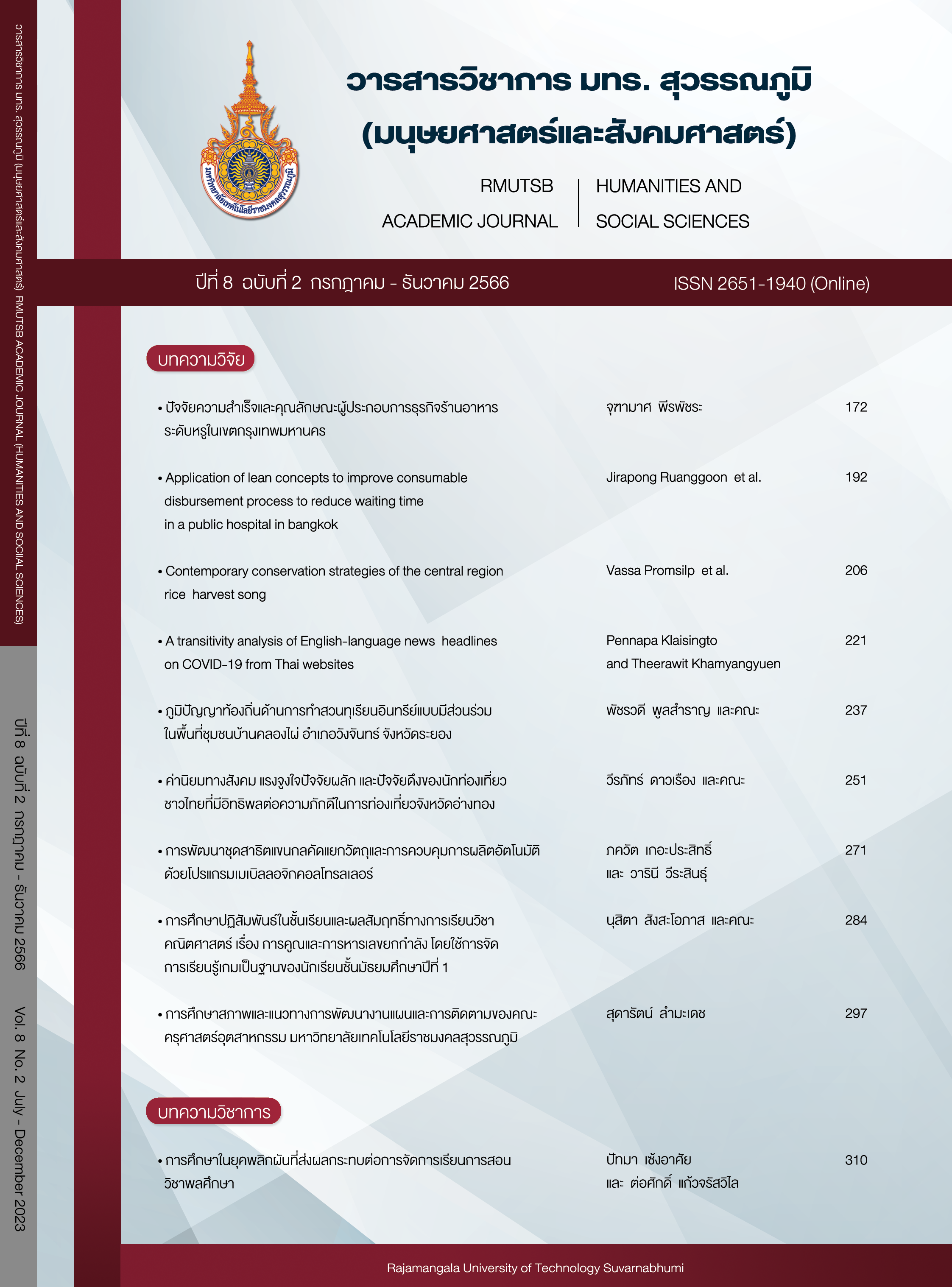ค่านิยมทางสังคม แรงจูงใจปัจจัยผลัก และปัจจัยดึงของนักท่องเที่ยวชาวไทยที่มีอิทธิพลต่อความภักดีในการท่องเที่ยวจังหวัดอ่างทอง
Main Article Content
บทคัดย่อ
งานวิจัยนี้มีวัตถุประสงค์เพื่อศึกษา 1) ค่านิยมทางสังคมของนักท่องเที่ยวชาวไทย 2) แรงจูงใจปัจจัยผลักของนักท่องเที่ยวชาวไทย 3) แรงจูงใจปัจจัยดึงของนักท่องเที่ยวชาวไทย 4) อิทธิพลของค่านิยมทางสังคมที่ส่งผลต่อความภักดีต่อการท่องเที่ยวในจังหวัดอ่างทอง โดยเก็บรวบรวมข้อมูลจากแบบบสอบถามจากนักท่องเที่ยวชาวไทย จำนวน 400 คน กำหนดขนาดกลุ่มตัวอย่างจากสูตรของคอแครน และใช้เทคนิคการสุ่มแบบบังเอิญ วิเคราะห์ข้อมูลด้วยค่าร้อยละ ค่าเฉลี่ย ค่าเบี่ยงเบนมาตรฐาน การวิเคราะห์องค์ประกอบ และการวิเคราะห์เส้นทางปัจจัย ผลการศึกษาพบว่า 1) นักท่องเที่ยวให้ความสำคัญค่านิยมการทำงานและสิ่งศักดิ์สิทธิ์มากที่สุด 2) แรงจูงใจปัจจัยผลักนักท่องเที่ยวให้ความสำคัญกับเรื่องความปลอดภัย สุขภาพที่ดี รางวัลชีวิต 3) แรงจูงใจปัจจัยดึงคือเรื่องเกี่ยวกับมาตรฐานที่พัก และ 4) ค่านิยมทางสังคมมีอิทธิพลเชิงบวกต่อความภักดีในการท่องเที่ยวจังหวัดอ่างทอง ผ่านแรงจูงใจปัจจัยผลัก เท่ากับ 1.03 ค่านิยมทางสังคมมีอิทธิพลเชิงบวกต่อความภักดีต่อการท่องเที่ยวในจังหวัดอ่างทอง ผ่านแรงจูงใจปัจจัยดึง เท่ากับ 1.25 และค่านิยมทางสังคมมีอิทธิพลทางตรงต่อความภักดีในการท่องเที่ยวจังหวัดอ่างทองเท่ากับ 1.50
Article Details

อนุญาตภายใต้เงื่อนไข Creative Commons Attribution-NonCommercial-NoDerivatives 4.0 International License.
เอกสารอ้างอิง
Angthong Governor's Office. (2019). Strategy of Ang Thong Province. Retrieved 10 November 2019, from http://www.angthong.go.th/2556/home.php (in Thai)
Chon, K. (1989). Understanding recreational traveler's motivation, attitude and satisfaction. The Tourist Review, 44(1), 3-7.
Cochran, W. G. (1977). Sampling techniques (3rd ed.). New York: John Wiley and Sons.
Crompton, J. L. (1979). An assessment of the image of Mexico as a vacation destination and the influence of geographical location upon the image. Journal of Travel Research, 18, 18-23.
Dann, G. M. (1981). Tourist motivation an appraisal. Annals of Tourism Research, 8, 187-219.
Department of Tourism. (2019). Thailand tourism strategy 2019. Retrieved 10 November 2019, from http://www.mots.go.th/more_news_new.php?cid=521 (in Thai)
Geertz, C. (2000). The interpretation of cultures: Selected essays. New York: Basic Books.
Gnoth, J. (1997). Tourism motivation and expectation formation. Annals of Tourism Research, 24(2), 283-304.
Hsu, C. H. C., & Huang, S. (2016). Reconfiguring Chinese cultural values and their tourism implications. Tourism Management, 54, 230-242.
Hung, W. L., Lee, Y. J., & Huang, P. H. (2016). Creative experiences, memorability and revisit intention in creative tourism. Current Issues in Tourism, 19(8), 763-770.
Jiang, S., Scott, N., Tao, L., & Ding, P. (2018). Chinese tourists’ motivation and their relationship to cultural values. Anatolia, 30(1), 90-102.
Komin, S. (1990). Culture and work-related values in Thai organizations. International Journal of Psychology, 25, 681-704.
Lee, C. H., Huang, S. Y., Barnes, F. B., & Kao, L. (2008). Business performance and customer relationship management: The effect of IT, organizational contingency and business process on Taiwanese manufacturers. Total Quality Management, 21(1), 43-65.
Oliver, P. (2010). The student’s guide to research ethics. Maidenhead: Open University Press.
Park, S., Hsieh, C., & McNally, R. (2010). Motivations and marketing drivers of Taiwanese island tourists: Comparing across Penghu, Taiwan and Phuket, Thailand. Asia Pacific Journal of Tourism Research, 15(3), 305-317.
Park, S. H., Lee, C. K., & Miller, J. C. (2015). A comparative study of the motivations, activities, overall satisfaction, and post-trip behaviors of international tourists in Macau: Mainland Chinese, Hongkongese, Taiwanese, and Westerners.
Asia Pacific Journal of Tourism Research, 20(10), 1174-1193.
Phetprakong, J. (2018). Tourists’ motivations for traveling in Muang District, Songkhla Province. Parichart Journal, Thaksin University, 31(1), 178-184. (in Thai)
Pizan, A., Jansen-Verbeke, M., & Steel, L. (1997). Are all tourists alike, regardless of nationality? the perceptions of Dutch tour-guides. Journal of International Hospitality, Leisure & Tourism Management, 1(1), 19e38.
Reisinger, Y. (2009) International Tourism: Culture and Behaviors. Betterworth, Oxford.
Robinson, S., & Etherington, L. (2006). Customer loyalty: A guide for time travelers. New York: Palgrave Macmillan.
Yoon, Y., & Uysal, M. (2005). An examination of the effects of motivation and satisfaction on destination loyalty: A structural model. Tourism Management, 26, 45-56.
Zeithaml, V. A., Bitner, M. J., & Gremler, D. D. (2009). Services marketing: Integrating customer focus across the firm (5th ed.). Singapore: McGraw-Hill and Irwin.


